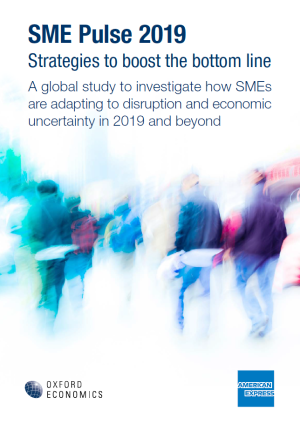Ungated Post | 08 Mar 2019
SME Pulse 2019: Strategies to boost the bottom line

Approaching 2019, SMEs are confident they can continue to prosper, despite economic uncertainty, disruptive technologies, and threats to global trade. This year’s SME Pulse report highlights a notable shift in attitudes toward technology, as SMEs deploy it to increase both top and bottom lines.
In October and November 2018, we surveyed 3,000 SMEs in 12 countries, and found their optimism in global economic prospects to be more robust than ever. Nevertheless, predictions about revenue and profit growth, though positive, are less rosy than in our last survey. Over the next three years, SMEs will need to work smarter to improve their top- and bottom-line performance. Our research highlights the ways in which SMEs are planning to achieve this, by playing to their unique strengths as SMEs. They are becoming more ambitious in using technology, and prioritising innovation, particularly initiatives that nurture organic innovation among their own employees. This emphasises the importance of attracting, retaining, and motivating a skilled workforce.
Read the SME Pulse 2019 report
Read the SME Pulse 2018 report
Read the SME Strategies for Success 2017 report
Our Thought Leadership team produces original, evidence-based research made accessible to decision-makers and opinion leaders. Principals for this project included:
Oxford Economics’ team is expert at applying advanced economic tools that provide valuable insights into today’s most pressing business, financial, and policy issues.
To find out more about our capabilities, contact:
EMEA
Paul Donnelly
+44 (0)203 910 8077
Email
Americas
Diantha Redd
+1 (646) 503 3052
Email
Asia
Christie Tang
+852 3974 8841
Email
Related Services

Post
KPMG M&A Outlook 2026: Between Uncertainty, Resilience, and Seizing Opportunities
Discover how Germany’s M&A landscape is evolving – with a focus on growth, AI and post-merger value creation.
Find Out More
Post
Silver, the next generation metal
This report highlights the critical role silver plays in data centres and artificial intelligence (AI), automotive and electric vehicles (EVs), and solar energy photovoltaics (PVs). With these sectors expected to expand significantly over the coming years, we expect future silver demand to be strong.
Find Out More
Post
Powering the UK Data Boom: The Nuclear Solution to the UK’s Data Centre Energy Crunch
The UK’s data centre sector is expanding rapidly as digitalisation, cloud computing, and artificial intelligence (AI) drive surging demand for high-performance computing infrastructure.
Find Out More